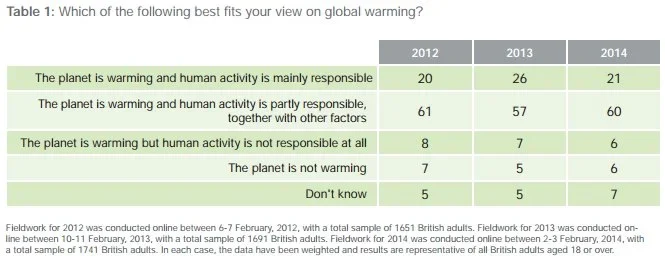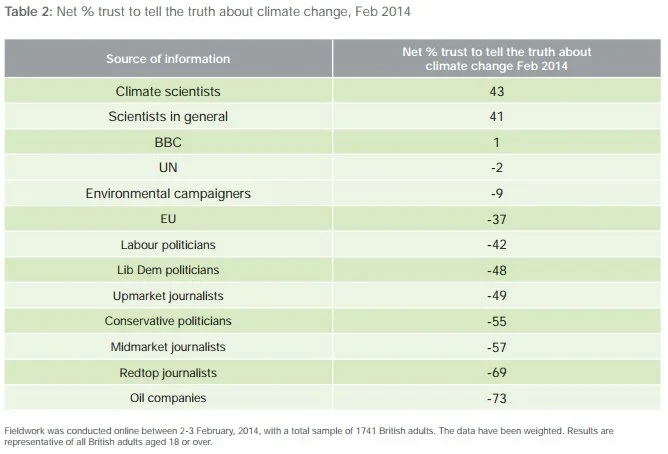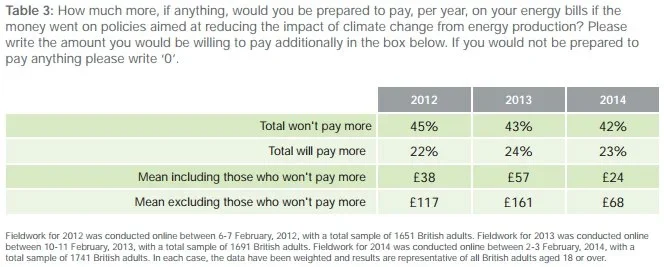Journalists and politicians frequently claim that the political consensus on climate change that existed in 2008, when the Climate Change Bill passed through the Commons with only a handful of votes against, is now falling apart. Certainly, opponents of active climate change policy are prominent in the media and, at least before the floods of early 2014, cutting energy prices was much higher on the political agenda than climate change.
But is there any evidence that British public opinion has turned climate-sceptic? The public certainly wants to pay less for energy, so that anyone who proposes climate change measures that increase energy prices is unlikely to be popular, but is that connected with a rise in climate scepticism?
In 2012, we began a yearly tracking poll on climate change for the YouGov-Cambridge Programme. We were interested in three issues: what view does the British public take about whether climate change is happening and whether humans are responsible for it; which sources of information about climate change does the public trust; and how much do people say they are willing to spend on energy bills to avert climate change? It is far too early to draw any conclusions about trends in the data, but, with three years of figures to consider, some interesting patterns are emerging that throw light on whether the public is following the media and political elite into opposition to active climate policies.
The Reality and Causes of Climate Change
On the issue of what the public thinks about the reality and causes of climate change, a stable picture is beginning to form:

The expert view, as expressed by the Intergovernmental Panel on Climate Change, is that it is ‘very likely’ (according to its 4th Assessment Report), or now ‘extremely likely’ (its 5th Assessment Report), that human activities have caused more than half of the rise in global mean surface temperature in the last half century. That view is accepted by only between a fifth and quarter of the public. But about 80% of the public accept that climate change is happening and that human activity is at least partly responsible. Climate sceptical views, such as the belief that human activity is not at all responsible for climate change or that the planet has stopped warming (the favourite claim of politicians such as Lord Lawson and Peter Lilley, who oppose active climate change policy) are held by only around a seventh or an eighth of the population and there is no sign that such views are becoming more popular.
Trusted Sources of Information
On which sources of information people trust to tell the truth on climate change, the result of the 2014 survey differs little from those in 2012 and 2013. (See results) The table lists sources in order of their net score for trust to tell the truth (that is, the percentage saying that they trust a source ‘a great deal’ or ‘fair amount’ minus the percentage who saying that they trust it ‘not much’ or ‘not at all’).

In broad terms, scientists are the only source with a clear positive rating. There is a more than 40 percentage point lead for those who trust scientists to tell the truth about climate change over those who do not trust them. The BBC and the UN receive a neutral rating. Environmental campaigners are rated negatively, although only to a mild degree. All other sources are not trusted, but the European Union (EU) is less distrusted than politicians and politicians are on the whole less distrusted than journalists, except that there is an overlap between journalists from the ‘serious’ press (Guardian, Independent, Times and Telegraph) and Conservative politicians. Least trusted is the fossil fuel industry. The average score of sources likely to express sceptical views – oil companies, redtop and midmarket journalists and Conservative politicians – is very negative, at -63%.
The only change in the order of these net trust ratings over the three years of the tracker is that academic specialists in climate change have overtaken generic scientists at the top of the list. That perhaps reflects a final fading away of any effect of the ‘Climategate’ furore, although in terms of magnitude the change is quite small.
The only large movement in trust for a specific source over the period is a drop in net trust of the BBC from +13% in 2012 to +1% in 2014. That movement might reflect a general drop in trust in the BBC as a result of the Savile affair, but it might also be a consequence of the BBC’s decision, as its director of editorial policy David Jordan disclosed to the Commons’ Science and Technology Committee in July 2013, to reject Professor Steve Jones’ recommendation that the BBC should treat climate science as ‘settled’. The BBC’s policy of lining up scientists against politicians to discuss the reality and causes of climate change might be reducing the credibility of the BBC itself.
The high degree of trust in scientists is another piece of evidence against the proposition that the public is becoming more climate-sceptic. Confidence in scientists to tell the truth about climate change is high and stable, whereas that in climate-sceptic sources is very low and also stable.
One might ask how it is possible for the public to place climate scientists so far ahead of other sources in terms of trust, but for only 20-25% of them to agree with the existing scientific consensus among climate scientists about the extent of human influence on climate change. The most plausible answer to that question is that much of the public does know about the scientific consensus about the fact of human causation of climate change but does not know about the consensus around the extent of human causation. As for why that might be, one obvious place to look is the BBC. As a result of its view that even the fact of climate change is not settled, let alone the fact of human causation of climate change, it has very little space left for debating the extent of human causation.
Willingness to Pay
A change does seem to have occurred on willingness to pay more on energy bills to reduce the risks of climate change. The tracker asks how much more, if anything, the public would pay on energy bills to reduce the impact of climate change:

Although the percentage of the population willing to pay more has not changed – remaining at between a fifth and a quarter – those who are willing to pay something are willing to pay very much less in 2014 than in previous years, a fall of about half. (If the cost is expressed in terms of an amount per week, the average amount people are willing to pay is higher and the fall in 2014 is less steep, but the fall is still more than 40%).
To what might we attribute the fall in willingness to pay? It cannot be an increase in climate scepticism, since we know from responses to the questions about the reality and causes of climate change that there has been no such increase. That conclusion is confirmed by the absence of any fall in the proportion of the population willing to pay something for reducing the risks of climate change. But it also cannot be a result of general economic conditions. Unemployment was higher and GDP growth lower in 2012 than in 2014.
The most plausible explanations lie in the increases in energy prices themselves and the politics surrounding those increases – the Labour Party’s energy price freeze proposal and the Conservatives’ response that ‘green levies’ on energy prices should be removed. It is not surprising that people say they are less willing to pay more for environmental benefits when prices are rising rapidly and they learn that one party believes it is feasible to stop all price rises whatever their purpose and another party says that enough has already been added onto bills for environmental purposes.
Conclusion
From this evidence, we should treat with extreme caution claims that public opinion is turning against the scientific consensus about climate change. The politics of energy prices might be important and interesting, but seems entirely separate from beliefs about climate change. As for the politics of climate change, the main lesson is that the climate scepticism of the BBC and much of the press does seem to be standing in the way of public access to the sources of information the public most trusts on the issue, but the net result is not growing climate scepticism but only a certain hesitation about what the situation is.








